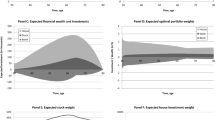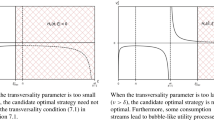Summary.
This paper derives the equilibrium of an infinite-horizon discrete-time CAPM economy in which agents have discounted expected quadratic utility functions. We show that there is an income stream obtainable by trading on the financial markets which best approximates perfect consumption smoothing (called the {\it least variable income stream} or LVI) such that the equilibrium consumption of each agent is some multiple of the LVI and some share of aggregate output. The welfare of agents is a decreasing function of the lack of consumption smoothing achievable, measured by the distance of the LVI from the perpetuity of one unit of income for ever. If in addition the economy has a Markov structure, the LVI, and hence the equilibrium, can be calculated by dynamic programming. When the model is calibrated to US data a striking prediction emerges: the quasi-irrelevance of the bond market. Infinitely-lived agents achieve almost all their desired consumption smoothing by applying carryover strategies to equity, the proportion of agents' portfolios in bonds rarely exceeding 3%.
Similar content being viewed by others
Author information
Authors and Affiliations
Additional information
Received: October 16, 1998; revised version: February 8, 1999
Rights and permissions
About this article
Cite this article
Magill, M., Quinzii, M. Infinite horizon CAPM equilibrium. Econ Theory 15, 103–138 (2000). https://doi.org/10.1007/s001990050003
Issue Date:
DOI: https://doi.org/10.1007/s001990050003




